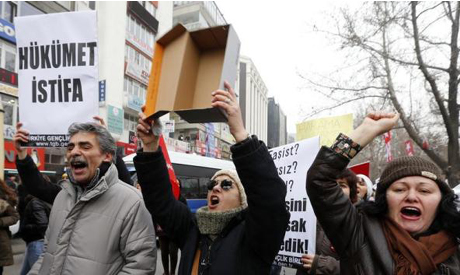
A demonstrator holds a shoe box, as a reference to reported shoe boxes of cash found in the house of Halkbank CEO Suleyman Aslan, during a demonstration against Turkey’s ruling Ak Party (AKP) and Prime Minister Tayyip Erdogan in Ankara December 21, 2013. The sign at left reads: “Government has to resign.” (Photo: Reuters)
A long festering but now open feud between erstwhile allies Prime Minister Recept Tayyip Erdogan and US-based Muslim cleric Fethullah Gulen is at the heart of a graft probe that now threatens Turkey's government.
Called "Hizmet" or service, the movement emerged in the 1970s around the charismatic young imam Fethullah Gulen. Today aged 73, the preacher has lived in the eastern US state of Pennsylvania since he left Turkey in 1999 to escape prosecution on charges of "anti-secular activities". His self-imposed exile came before Erdogan's Islamic-based government came to power in 2002 in a victory that raised concern both in and outside secular Turkey.
Gulen is said to wield huge influence back home, with followers in key positions in the police and judiciary -- two sectors the 59-year-old Erdogan has purged as the men's rivalry heats up.
The imam rarely speaks openly to the media but uses official spokesmen.
His organisation revolves around a network of schools in more than 100 countries that promote Turkish culture and a moderate Islamic viewpoint. It also has a series of television stations and is connected with the biggest paper in Turkey, the Istanbul-based Zaman, which also presents a moderate Islamic take on world events.
The Hizmet brotherhood says it has several million followers and an influential network in business circles. Numerous elected officials or figures close to power are seen as Gulen allies, including the current President Abdullah Gul and the Deputy Prime Minister Bulent Arinc.
After the landslide victory of Erdogan's Islamic-based Justice and Development Party (AKP) in legislative elections 11 years ago, Hizmet was one of the government's main allies. The two groups share similar conservative political and religious views. Both also maintained distance from the military, which sees itself as guarantor of Turkey's secular establishment.
Hizmet notably secured a following in critical state institutions like the police and the judiciary, which traditionally had been closer to the "old Kemalist regime", the avowed secular and Westernized stance enshrined in the constitution when modern Turkey's founder Mustafa Kemal Ataturk broke with the Ottoman theocracy in 1923.
In recent years, however, splits appeared in their alliance. Last June, when police cracked down violently on anti-government protests engulfing the country, both President Gul and Deputy Prime Minister Arinc, as well as the Zaman daily, initially broke with the government's hard line and urged it to go easy on the demonstrators.
The cracks broke wide open last month, however, when the Erdogan government announced its intention to close the network of "dershane", private schools offering students extra tutoring that are widely attended in Turkey. The Hizmet brotherhood directs hundreds of such schools in Turkey, which has provided a main source of its revenue.
Since then, "Gulenist" spokesmen have openly denounced the government's move and vowed to do everything possible to keep the schools open.
For Erdogan, there is no doubt that the Gulen brotherhood is behind the anti-corruption probe that implicated dozens of the prime minister's close allies, including his own son. The enquiry forced the embattled Erdogan, said to be a presidential-hopeful in 2014, into a massive government reshuffle after three ministers resigned.
Though Erdogan has never publicly cited his adversary, he has called the graft probe a retaliation by the "Gulenists" to hit back at his plan to close down the "dershane" schools.
He has also railed against a "state within a state" he says is trying to wield power in Turkey.
Defiant despite calls for his resignation, the prime minister ordered an unprecedented purge in the police, sacking dozens of officers said to be linked to Gulen. He accused them of failing to notify him about the corruption investigations. He also named several new prosecutors in Istanbul in a bid to control those handling the graft probe.
The Gulenists hit back, however, when Turkeys' top court on Friday blocked implementation of a government decree ordering police to inform their superiors before launching investigations issued by public prosecutors, local media reported.
While the Hizmet brotherhood up to now has shown no electoral ambitions, analysts expect the war between the two sides to have an impact on 2014 municipal elections.
"The myth of the unsinkable AKP is now over," wrote columnist Cihan Celik in the Hurriyet Daily News on Saturday.
In the last 10 days, five lawmakers have resigned from the AKP party which is now said to be riddled by dissent.
Short link: